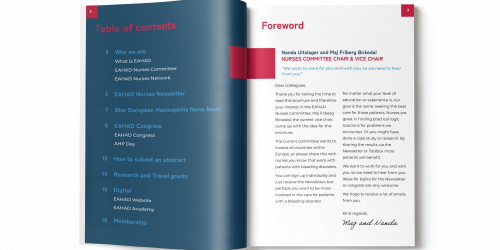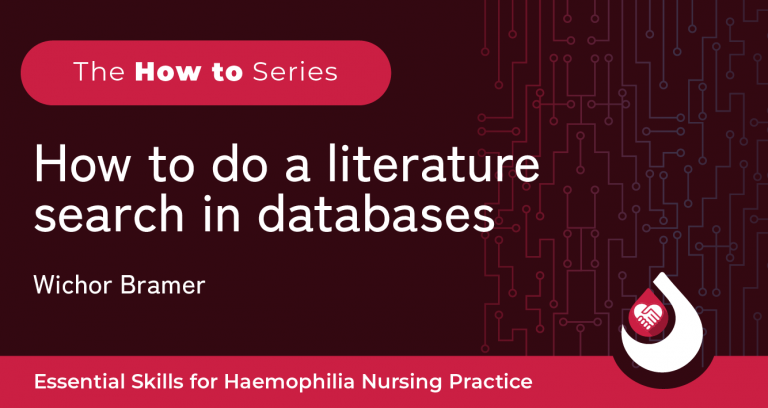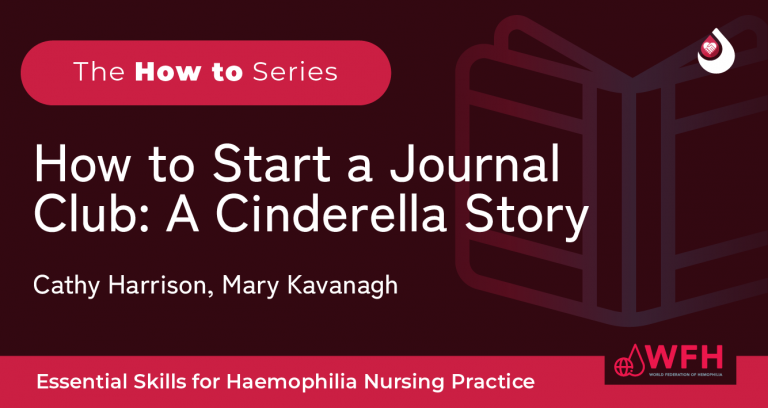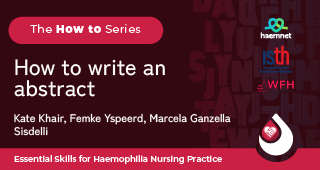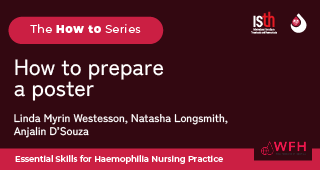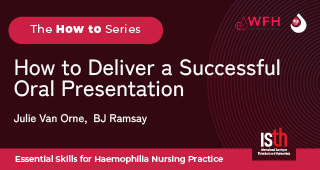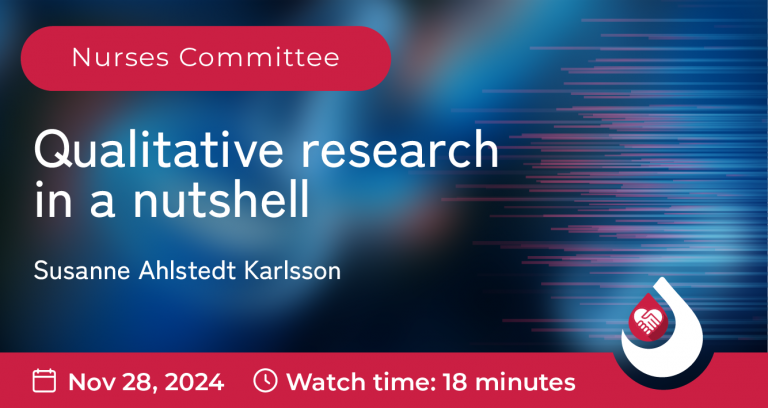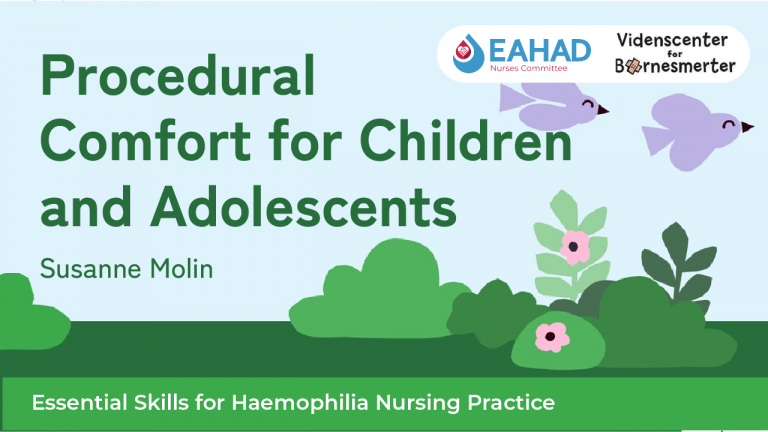Nurses Committee Newsletter – Fall 2025
Nominate a haemophilia nurse for the EAHAD Nurses Committee Award!
Let’s focus on all the good work that is being done by European haemophilia nurses. Do you have an outstanding colleague making a difference, or perhaps a nursing-led project at your centre deserving recognition? The EAHAD Nurses Committee will choose an extraordinary nurse to honour with the prestigious Star European Haemophilia Nurse award!
Please write a short explanation (maximum one page) highlighting the nurse’s work, project, or exemplary patient care and send it to giuliana.giardina@eahad.org. This could include patient information materials and educational projects, nursing clinics, quality projects, excellent patient care, activity in the bleeding community, etc. Nominees must be registered nurses in Europe, and the last date to nominate is the 19th of January 2025.
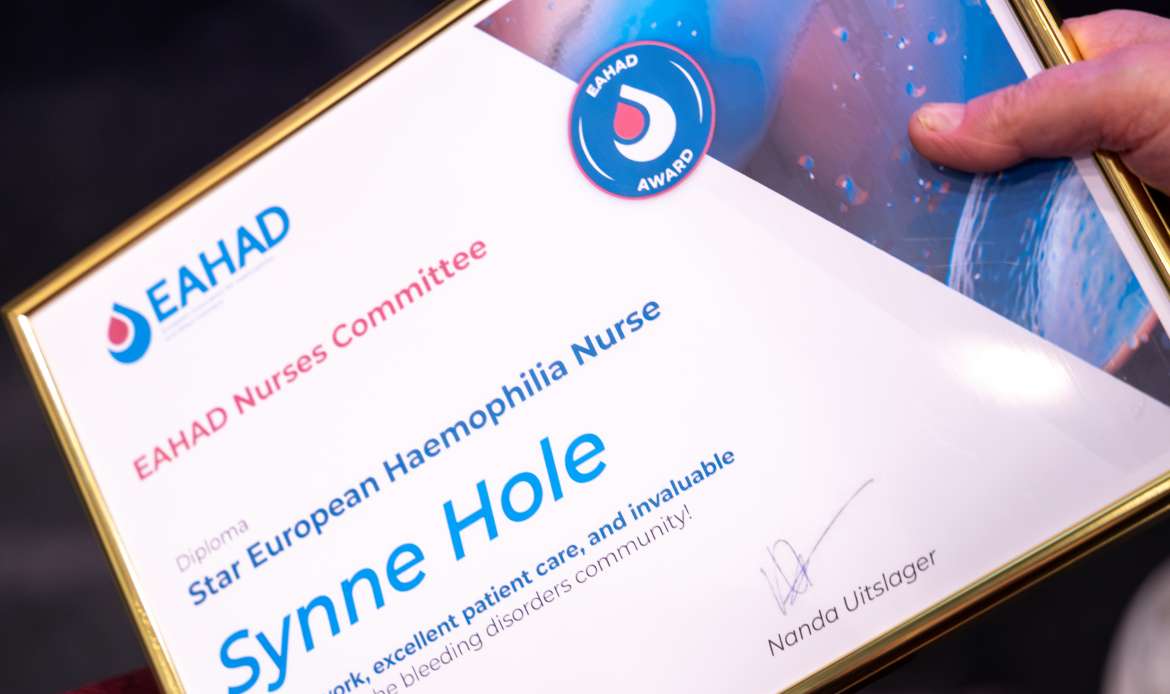
EAHAD 2026
Travel grants
EAHAD awards travel grants to junior physicians and scientists (35 years old or younger), PhD students, post-doctoral researchers, nurses, physiotherapists, psychosocial professionals and other allied healthcare professionals wishing to attend its annual Congress.
Travel Grants are available for both European and international participants. The number of travel grants to be awarded varies each year and has yet to be confirmed for 2026. The deadline for applications is Wednesday 19 November 2025 at 23:59 CET.
AHP Day
Discover the latest advancements and cutting-edge research that awaits you at EAHAD 2026 AHP Day!
Dublin
EAHAD 2026 will be held in The Convention Centre Dublin (CCD) – Conference Venue in Ireland. To help make your trip a pleasant one we would like to share the following information about travelling Dublin:
Dublin Airport has two terminals with direct flights to and from most major UK and European cities. It is located 12km from the Convention Centre and public bus and private coach services provide a 24 hour service into the city centre Dublin Airport Bus Services | Routes, Timetables & Tickets and generally take 30 – 45 minutes. Tickets for the coach services can be purchased on the bus. If you are using the public bus service (Dublin Bus) pay on the bus or purchase a pre-paid leap* card. If you are paying on the bus, you will need the exact change to buy a ticket. Alternatively, the taxi journey takes about 20 minutes and costs €25 – €30. There is no train or tram service.
The Leap Visitor Card (1/3/7 days, €8/€18/€24) grants unlimited travel on Dublin Bus, Luas, DART and Commuter Rail. You can purchase a Leap card at the Airport, or order online and have it delivered to your home in advance of your trip.
Weather in Ireland is unpredictable and can be cold and wet in February so keep an eye on the forecast before packing. If you are planning on extending your trip, the Irish Corporate Tourism website Failte Ireland has information about visiting Dublin and its many tourist attractions. In February, both the city and the many tourist attractions are quieter but it is still advisable to and consider the discount cards available and book tickets in advance
On behalf of the Nurses Committee, we wish you a safe trip and look forward to seeing you in Dublin.
EHC Conference Recap
Vienna 3-5 October 2025
The EHAHAD Nurses Committee was represented by Maj F. Birkedal at the annual European Haemophilia Consortium (EHC) meeting.
This year, the conference emphasised mental health, focusing on the psychosocial burden associated with living with bleeding disorders. Particular attention was given to the challenges of assessing mental health outcomes both in research studies and clinical practice.
The burden experienced by individuals with bleeding disorders extends beyond treatment adherence. It encompasses a range of complex factors, including, but not limited to: societal misunderstandings, depression linked to chronic pain, physical decline, self-perceived physical functionality, fatigue, social isolation, past trauma, parental guilt, and anxiety.
Despite significant advancements in haemophilia treatment, the EHC highlighted ongoing disparities in treatment accessibility across Europe. Barriers to care remain complex and multifactorial, influenced by political, economic, and systemic factors, as well as healthcare providers’ attitudes and preferences.
Moreover, it is imperative to recognize that the therapeutic advancements heralded as a revolution in hemophilia management have not been equally experienced by all patient groups. Women and girls with bleeding disorders, along with individuals affected by rare bleeding disorders, continue to face limited treatment options. The disparity between the wide availability and customisation of therapies for severe haemophilia and the comparatively sparse, burdensome options for these populations underscores a critical gap in healthcare equity.
Meet key patients representatives!
In the newsletter we report on a regular base about the EHC, but are you all familiar with the work the EHC does? In order to get a better understanding we interviewed 3 members of the EHC to tell you more. If you want more, take a look at their informative website: European Haemophilia Consortium (EHC)
What is the history of the EHC? Why is the EHC important to you?
The European Haemophilia Consortium (EHC) was established in 1989 and is headquartered in Brussels. Its original mission was to advocate for the European bleeding disorders community and to influence policies that improve access to care. Today, the EHC’s reach extends beyond the European Union, representing the majority of Council of Europe member states.
How many countries does the EHC represent?
As of June 2025, the European Haemophilia Consortium represents 49 patient organisations across 48 countries, with Kazakhstan being the newest member welcomed by our General Assembly. We are proud to stand for patients from a wide range of countries — from Iceland to Turkey, from Tajikistan to Israel — united by a shared commitment to better care. Our message is clear: no one should be left behind.
What are the short-term and long-term goals?
In short, our mission is to advocate, improve diagnosis and care, and strengthen patient representation at both national and European levels. We achieve this through targeted advocacy and collaboration with key stakeholders, by training and educating our members, and by raising awareness and sharing information on all bleeding disorders.
Who do you collaborate with within Europe, and maybe further?
We collaborate with a wide range of organisations to maximise the impact of our work while avoiding competition or duplication of efforts. We have signed a Memorandum of Understanding with the World Federation of Hemophilia (WFH) to strengthen our joint initiatives. We also work closely with EURORDIS and the European Patients’ Forum (EPF). We also signed a Memorandum of Understanding with EAHAD to try to join our voices and have healthcare providers and patients’ voices aligned.
As a patient organisation, we are a member of the Patients’ and Consumers’ Working Party (PCWP) of the European Medicines Agency (EMA). Our representatives also participate in EUHASS, EAHAD working groups, WFH committees, and the European Reference Network on Rare Haematological Diseases (EuroBloodNet), among other key platforms.
I know that some of this is on the EHC website, but you must click through to get there, and I am afraid few nurses will do.
I warmly invite everyone to explore our main website, www.ehc.eu, as well as our dedicated platforms: www.academy.ehc.eu, which offers a wide range of resources and information that can be particularly valuable for nurses, and www.community.ehc.eu, which highlights the activities and stories of our community.
Nurses play a vital role in patient care, and we are eager to see more of them actively involved in our events, sharing their experiences and best practices to inspire and support others.
And personally, what made you decide to devote your time to EHC?
In short, I’m the mother of three identical twin girls and one boy. One of my daughters has severe haemophilia A, while the other is a carrier. This was entirely new to our family, and it led me to join the French Haemophilia Society in January 2000. As a volunteer, I worked for many years to raise awareness about women with haemophilia and to train nurses on the condition.
In 2024, I became CEO of the EHC after having represented the community on the EHC Steering Committee since October 2013. I am deeply proud to ensure that the EHC is managed in line with our core values: independence, respect, transparency, accountability, and sustainability.
What made you put yourself up for election?
There were two main reasons. On the one hand, I have always been closely engaged in the bleeding disorders community as a patient and a patient representative, which has given me extensive knowledge and diverse perspectives on the complexity of our community and its real needs. On the other hand, I wanted to bring my own contribution by making the work of the EHC more tangible — focusing on practical advocacy tools that empower our member organisations. My vision has never been for EHC to “take over” their issues, but rather to support them with resources, knowledge, and advocacy strategies so they can strengthen care and treatment in their own countries.
During the past year, what made you happy or sad in relation to your work for EHC?
I am always happy when I see that EHC can make a real difference in the lives of our member organisations. It inspires me to witness a renewal of mindsets within associations — when people understand that self-advocacy, both individually and collectively, is what drives real
change. I am also deeply encouraged when I see empathy within our community, when partners treat each other as equals, helping and learning from one another.
More than sadness, what I sometimes feel is dissatisfaction when this does not happen. But even those moments serve as extra motivation to continue working with dedication, because they show us where we still need to push forward.
What do you value about the bleeding disorder nurses in your treatment centre, and is there something you miss?
I highly value the dedication, expertise, and day-to-day care that nurses bring to our community. They are often the fi rst point of contact for patients and families, and their role is essential. However, I sometimes feel that across Europe their voice and expertise are not equally recognised in treatment centres. Nurses should always have a prominent role in the management of bleeding disorders, with their knowledge and perspective fully integrated into decision-making. Achieving this equality and harmonisation is hard work, but it is necessary if we want a stronger and more patient-centred healthcare system.
What is the most important thing you want others with a bleeding disorder to know about EHC?
The EHC is a consortium of 49 national member organisations, and its greatest strength lies in the diversity of knowledge and experiences across these communities. It is not an entity in isolation — it is the collective of all our members, each contributing and sharing responsibility for the well-being of all. This applies both across different national realities and across different bleeding disorders.
I would like people to see EHC as a beacon of empathy and inclusion. For me, that is the essence of true advocacy: an organisation that represents people with bleeding disorders by listening, uniting, and standing together.
What made you put yourself up for election?
Since 2004, I have been actively involved in the bleeding disorders community in Galicia and Spain. I have type 3 von Willebrand disease, and for many years, I was the only person with VWD in my regional association and one of the few women involved; everyone else was a boy with haemophilia.
Over the years, I have learned that the most effective way to raise awareness is to increase visibility. What is not seen or named simply does not exist.
In 2023, I volunteered to join the von Willebrand Committee (vWD). For me, it was essential to connect with more people living with VWD and explore how we could raise awareness of such an under-recognised condition at a European level, especially since reaching these patients is often a challenge. Since then, I’ve done my best—together with my fellow committee members—to share my experience and help make VWD more visible.
In 2024, I decided to run for the Steering Committee (SC) because I saw it as an opportunity to learn more about how other countries work and to contribute our own experience to help strengthen the community. It was also a chance to continue raising awareness about von Willebrand disease and the women living with bleeding disorders.
During the past year, what made you happy or sad in relation with your work for EHC?
What excites me the most is the strong sense of community and the number of volunteers who are involved. I find it heartening that, no matter what country you’re in, this shared way of working and connecting remains the same. What saddens me the most is seeing how many countries still lack access to adequate treatment. There is still a long road ahead of us.
What do you value about the bleeding disorder nurses in your treatment centre, and is there something you miss?
Haemophilia nurses are an essential part of the care team for people with bleeding disorders. From diagnosis to long-term follow-up, they are a constant presence, helping us manage our condition and learn how to live with it. In my experience, they are often more sensitive to the needs of women with bleeding disorders than doctors. Bleeding disorders go far beyond treatment alone, and nurses often understand that best. What I feel is lacking is the presence of specialised nurses in every centre. In Spain, due to our decentralised healthcare system, not all hospitals—especially smaller ones—have a haemophilia nurse, and this is absolutely essential.
What is the most important thing you want others with a bleeding disorder to know about EHC?
Aside from the fact that they can find a wealth of information on our website—not just about how we work, but also about bleeding disorders and much more—I believe it’s vital for people with bleeding disorders to know that the EHC is a European umbrella organisation that represents us on a broader level. Having influence at the European level is increasingly important, as decisions made by bodies like the European Parliament or the EMA directly affect us—both as individual patients and as countries. It’s crucial for policymakers to understand our situation so that legislation and regulations work in our favour. In addition, the EHC supports national organisations facing more complex situations and in need of assistance. It also creates training and exchange opportunities that, in my opinion, are a fantastic way to learn and bring valuable experiences back home to continue making progress.
What can the EAHAD Nurses Committee offer you
The purpose of EAHAD Nurses Committee is to improve the quality of care for people living with haemophilia and allied bleeding disorders throughout Europe by promoting nurses as members of the multidisciplinary team both in their role providing clinical care as well as engaging in scientific research.
The committee published an online brochure describing the many ways we can assist via the network, grants, online education, and much more. For specific details or examples, feel free to explore the brochure available on our website.
EAHAD Academy
Latest productions from the EAHAD Nurses Committee
In 2023, together with nurses from the WFH and ISTH, we launched a How-to Series designed to support novice nurses in developing their skills in abstract writing, poster creation, and oral presentations.
Following the success of the first series, nurses from EAHAD, ISTH, and WFH decided to continue the collaboration with a second three-part How-to Series. The first two parts of this new series are already complete, and the third part on how to review an article will be released before the end of the year.
Other resources
Susanne Ahlstedt Karlsson, Senior Consultant, Specialist Nurse in Surgical Care, PhD, and Adjunct Senior Lecturer from Sweden, closed 2024 with an insightful presentation on qualitative research — exploring what it can achieve and when to use it.
She discussed the different research methods, as well as important practical aspects such as selecting and recruiting the right patients and determining the appropriate sample size. Susanne’s clear and engaging communication made this complex topic both accessible and highly informative.
EAHAD Podcast
Meet the Author Interview: A single centre experience with clinical use of Neria™ Guard as mode of pain and distress management in the administration of emicizumab in children with Maj Friberg Birkedal
Join us for the first “Meet the Author Interview” from the Nurses Committee, with Maj Friberg Birkedal, Chair, discussing how the Neria™ Guard infusion set may help reduce pain and distress for children receiving emicizumab. Drawing on real-world experience, she highlights why even small innovations can make a big difference in paediatric care.
Save the dates
WFH Congress
EHA2026 Congress
ISTH 2026
Stay in touch
We want to hear from you! If you would like to submit an article for consideration, please get in touch at info@eahad.org. The Nurses Committee would be grateful to receive any feedback you have about the newsletter. This is your newsletter. Tell us what you need!



